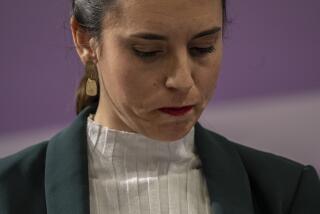Spain Decides to Deal Illegal Drugs a Blow
- Share via
MADRID — Not long after a drug pusher was shot outside the nearby grammar school, the woman who runs the newsstand in Dos de Mayo square caught her young son playing with a bloody syringe.
“Thank God the needle was capped, otherwise he would have jabbed himself,” she said, her eyes on the drug dealers sitting at their regular cafe tables. “I’ve seen everything here, but that really scared me.”
Consumption of illegal drugs in Spain has grown to the point that the government is drafting laws to punish users for the first time since democracy returned in 1977. Laws passed three years ago provide tough penalties for traffickers and money launderers.
In 1983, soon after gaining power, the Socialist government of Prime Minister Felipe Gonzalez lifted restrictions on the possession of vaguely defined “small amounts” of drugs for personal use.
By deciding to change the rules, the government is tacitly admitting that Spain’s drug problem is out of control. It also is a response to pressure from other members of the European Community partners to strengthen drug laws before the 12-nation trading bloc abolishes internal borders in 1993.
“We are heading for a new situation in Europe, and we need to bring our laws more in line with those of other EC countries,” said Santiago de Torres, deputy director of the government anti-narcotics program.
Spain is one of the main European entry points for Colombian cocaine, Moroccan hashish and heroin from Turkey. Drugs confiscated by Spanish police in 1989 made up 40% of the total in 16 major European countries.
So far this year, Spanish police have seized more than 3,800 pounds of cocaine, 480 pounds of heroin and 10 tons of hashish. They describe it as a small portion of the total entering the country.
The drug bill, which Parliament is expected to pass this month, imposes fines for consuming narcotics in public, discarding syringes or allowing drug use in public places such as bars and discos.
Unlike Italy, which passed a new law earlier this year, Spain does not plan to imprison drug users.
“We won’t throw addicts in jail and scare them away from treatment centers,” De Torres said. He predicted Italy also would not send drug users to jail, whatever its new law says, “because there’s no room in the jails and they don’t believe it’s the definitive solution.”
Some Spaniards want to give police more leeway to clean up drug-infested neighborhoods. They say dealers caught with small quantities of drugs now avoid conviction by claiming that it is for their personal use.
Half the 20,000 people at a recent protest in Barbate, in southern Spain, threatened small-time heroin dealers and painted “Drugs Sold Here” on pushers’ homes.
People who live in towns near Gibraltar, a British colony, demand that heroin dealers and addicts be expelled from the country. They say Gibraltar is the base for drug smugglers who supply Spain’s southern Mediterranean coast.
Agustin Sahagun, the conservative mayor of Madrid, called for tougher public consumption laws after the owners of Archy, a fashionable disco, claimed police had no grounds to close it for alleged use of cocaine on the premises.
Sahagun and other centrist and conservative politicians have criticized the initial permissiveness of the Socialists.
Gonzalez and many other Socialist Party leaders came of age in the 1960s, when drug use was considered a protest against the authoritarian rule of Gen. Francisco Franco.
Enrique Tierno Galvan, the venerable Socialist mayor of Madrid after Franco’s death in 1975, once told a youthful audience to “turn on and tune in.”
More to Read
Sign up for Essential California
The most important California stories and recommendations in your inbox every morning.
You may occasionally receive promotional content from the Los Angeles Times.













